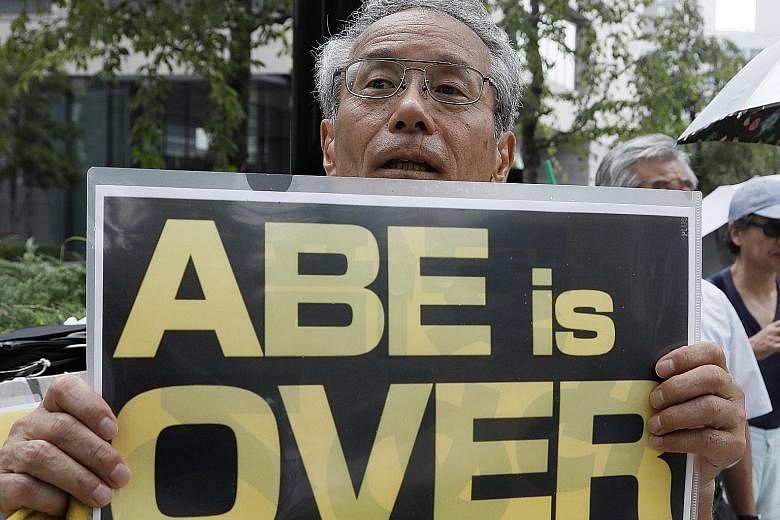Even with opposition lawmakers jeering and taunting him, Japanese Prime Minister Shinzo Abe did his best to stay calm during a two-day parliamentary hearing into a cronyism scandal that has evolved into his biggest political crisis.
His humility, a marked departure from his usual abrasiveness, did not go unnoticed by analysts and local media like The Japan Times.
He also apologised yesterday, after the leader of the national opposition Democratic Party, Ms Renho (who goes by one name), pointed out inconsistencies in Mr Abe's current remarks and what he had told Parliament last month.
"There were parts of my response that were not organised enough because the question was made in an abrupt manner," Mr Abe said, as he apologised for his "confusion" and retracted his previous comments.
While Mr Abe appeared to be more humble, University of Tokyo's political watcher Yu Uchiyamap told The Straits Times: "Given the apparent contradictions, I don't think (he) was persuasive enough in clearing up the doubts."
And Dr Sota Kato, the executive director of the Tokyo Foundation think-tank, said: "All the major points of contention have come down to competing claims about who said - or did not say - what."
In the event that there is no direct evidence to prove or disprove the claims, he said: "This isn't a court of law. This is politics. The public is free to make up its own mind about who's really telling the truth."
What was at stake in the two-day Diet session is public trust in Mr Abe and his ruling Liberal Democratic Party (LDP), who has been in power for the past 4½ years and until recently has been riding on a crest of rock-solid approval ratings.
But two successive scandals that implicated Mr Abe, along with a string of gaffes by LDP lawmakers, have led to perceptions of arrogance and evasiveness, resulting in nose-diving approval ratings that in some polls have plunged below 30 per cent. It also culminated in two electoral setbacks this month, in Tokyo and Sendai.
In the current saga, Mr Abe has been accused of exerting pressure to help the Kake Educational Institute or Kake Gakuen, which is chaired by his longtime friend Kotaro Kake, win a bid to open a veterinary school in Imabari city.
The accusation came soon after revelations of another alleged sweetheart deal for ultra right-wing education operator Moritomo Gakuen, whose former director is now under probe for fraud.
Over the two days of hearings, Mr Abe stood firm on his position that he and his government have been above board in their dealings with Kake Gakuen.
He also said there was no need to revoke the licence for Kake Gakuen to open Japan's first veterinary school in 52 years.
He kicked off the Diet session by acknowledging that his close ties with Mr Kake, whom he described as a friend since his student days, could have contributed to perceptions of favouritism.
He also asserted that, in spite of 14 meetings with Mr Kake over golf and dinners between 2013 and 2016, it was only on Jan 20 this year - when the bid was approved - that he found out Kake Gakuen had applied to open the school.
All he had known before, he emphasised, was that the bid's proposer was "Imabari city".
This led to jeers of disbelief by the opposition, which pointed to documents suggesting there has been implicit pressure from the top echelons of government to grant Kake Gakuen the permit in an alleged rubber-stamp deal.
Dr Kato said: "In the face of so many accusations, voters are likely to conclude that Mr Abe and his staff aren't telling the whole truth."
Mr Yoshihisa Inoue, secretary- general of the LDP's junior coalition partner Komeito, told a Kyodo News forum that while the road ahead might be tough, the track record of the LDP's policies will help it win back voters' trust. "It's challenging to win back trust once it's lost, but the LDP just needs to steadily work hard to turn each policy into a good result and explain itself carefully."

